Intellectual Property
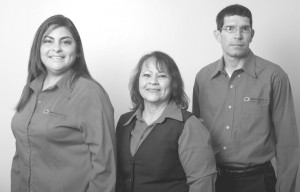 A significant part of our practice is devoted to our work in the intellectual property field. We offer a full service trademark practice: handling not only trademark registrations and enforcement, but also all IP-related matters such as copyright, patent, domain name and unfair competition matters.
A significant part of our practice is devoted to our work in the intellectual property field. We offer a full service trademark practice: handling not only trademark registrations and enforcement, but also all IP-related matters such as copyright, patent, domain name and unfair competition matters.
Our trademark department is fully equipped to handle all necessary work related to registering and maintaining your intellectual property, while our attorneys will gladly handle all legal issues related to IP-infringement. Our Trademark Administrators Mrs. Margaritha Croes, Mrs. Judessa Croes and Mr. Enrique Dirks can assist you with IP-matters in Aruba, Curacao, St. Martin (Dutch part) as well as the BES Islands (Bonaire, St. Eustatius and Saba). For more information on the different jurisdictions, please select the jurisdiction you are interested in:
Trademark in Aruba
Trademark law and practice in Aruba
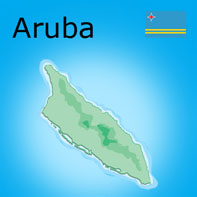 The trademark law in Aruba contains provisions for the registration and protection of trademarks and service marks. Aruba is a party to the Paris Union Convention for the protection of industrial property. In 1986, after Aruba acquired the status of a separate country in the Dutch Kingdom, Aruba set up its own trademark agency.
The trademark law in Aruba contains provisions for the registration and protection of trademarks and service marks. Aruba is a party to the Paris Union Convention for the protection of industrial property. In 1986, after Aruba acquired the status of a separate country in the Dutch Kingdom, Aruba set up its own trademark agency.
First use of trademark
Under Aruban law, the exclusive right to use a trademark belongs to the party who made first use of a mark in Aruba to distinguish his goods and/or services. First use can be based on sales, use or offering of the goods and/or services in the local market.
Pursuant to case law, first use can also be based on advertising of the goods and/or services in local or international media which are published or sold in Aruba or of which broadcasts can be received in Aruba, if such advertising is intended to reach the local consumer. It is advisable that advertisements should contain a clear indication as to the origin of the goods or services. The law contains a non-use provision pursuant to which an owner is only protected for a period of 3 years since his last use of the mark in Aruba.
Registration of a trademark as such does not give the registrant the exclusive right to use the mark. Pursuant to the law however registration of the mark creates a presumption that the registrant is the first user of the mark. This presumption places the burden of proof as to who is the first user of the mark on the registrant’s opponent, who claims to have the exclusive right to use the mark. The presumption that the registrant is also the first user of the mark can of course be rebutted by evidence to the contrary. Registrations and subsequent renewals are valid for 10 years.
All registrations are published in the Trademark Gazette. A trademark appeal against registrations can be filed within 6 months after publication of the registration in the Trademark Gazette.
Domain Name Registrations in Aruba
Setar N.V., the national telephone carrier, is the entity entrusted with the registration of domain names “.aw” and “.com.aw”. Registration of domain names is currently only open to Aruban legal entities or citizens. Foreign nationals or entities are currently not allowed to register their domain names. Sjiem Fat & Co. can register domain names for its clients in Aruba. The domain name will be registered in name of Sjiem Fat & Co.’s on behalf of the clients. To guarantee our client’s intellectual property rights as regards to their trademarks and domain names:
- a fiduciary agreement is drafted and signed between Sjiem Fat& Co. and the client
- we advise to have the domain name registered with the local trademark agency prior to the domain name registration.
Once we have been engaged with the registration of the domain names and after signing of the fiduciary agreement, we can proceed with the registration.
Trademark in Curacao
Trademark law and practice
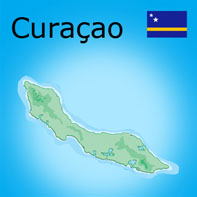 The Netherlands Antilles, consisting of the islands Curacao, the Dutch part of St. Martin, Bonaire, Saba and St. Eustatius, ceased to exist as of October 10th, 2010.
The Netherlands Antilles, consisting of the islands Curacao, the Dutch part of St. Martin, Bonaire, Saba and St. Eustatius, ceased to exist as of October 10th, 2010.
As of October 10th, 2010 Curacao and the Dutch part of St. Martin have become autonomous constituent states of the Dutch Kingdom, while the islands Bonaire, Saba and St. Eustatius have become Dutch municipalities known as the BES-Islands or the Caribbean Netherlands.
Current Netherlands Antilles registrations are valid for both Curacao and St. Maarten for their current term. No confirmation registration is necessary. However, for purpose of renewal of existing and filing of new registrations, the trademark owner must decide for which jurisdiction (Curacao and/or St. Martin) this must be done. This means that as of October 10th, 2010 new separate applications should be filed for Curacao and/or St. Martin when filing for a new registration or renewing an old one.
Curacao is a party to the Paris Union Convention for the protection of industrial property. Furthermore, Curacao may be designated as a territory under the Madrid Protocol.
First to file
First filing of the mark determines who acquires the exclusive right to use the mark.
A trademark or service mark registration can be declared null and void by the court upon the petition of any interested party, if no normal use of the mark has been made during an uninterrupted period of five years. Renewed use after such a five-year period can serve to fulfill the use requirement. Registrations and subsequent renewals are valid for 10 years.
Normal use means customary commercial use of the mark to distinguish the goods or services from those of other producers or service providers, with the purpose of maintaining or increasing market share, as opposed to mere token or symbolic use, with the intent to keep a registration valid.
Trademark in St. Maarten
Trademark law and practice
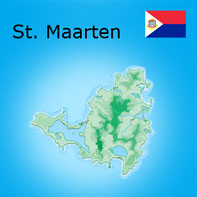 The Netherlands Antilles, consisting of the islands Curacao, the Dutch part of St. Martin, Bonaire, Saba and St. Eustatius, ceased to exist as of October 10th, 2010.
The Netherlands Antilles, consisting of the islands Curacao, the Dutch part of St. Martin, Bonaire, Saba and St. Eustatius, ceased to exist as of October 10th, 2010.
As of October 10th, 2010 Curacao and the Dutch part of St. Martin have become autonomous constituent states of the Dutch Kingdom, while the islands Bonaire, Saba and St. Eustatius have become Dutch municipalities known as the BES-Islands or the Caribbean Netherlands.
Current Netherlands Antilles registrations are valid for both Curacao and St. Martin for their current term. No confirmation registration is necessary. For purpose of renewal of existing and filing of new registration though, the trademark holder must decide for which jurisdiction (Curacao and/or St. Martin) this must be done. This means that as of October 10th, 2010 new separate applications should be filed for Curacao and/or St. Martin when filing for a new registration or renewing an old one.
St. Martin is a party to the Paris Union Convention for the protection of industrial property. Furthermore, St. Martin may be designated as a territory under the Madrid Protocol.
First to file
First filing of the mark determines who acquires the exclusive right to use the mark.
A trademark or service mark registration can be declared null and void by the court upon the petition of any interested party, if no normal use of the mark has been made during an uninterrupted period of five years. Renewed use after such a five-year period can serve to fulfill the use requirement. Registrations and subsequent renewals are valid for 10 years.
Normal use means customary commercial use of the mark to distinguish the goods or services from those of other producers or service providers, with the purpose of maintaining or increasing market share, as opposed to mere token or symbolic use, with the intent to keep a registration valid.
Trademark in BES Islands
Trademark law and practice
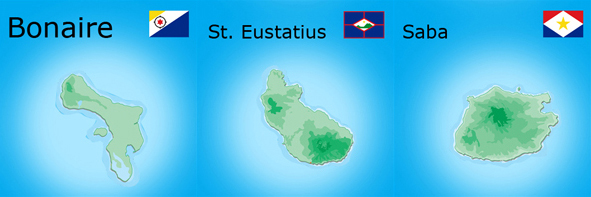 The Netherlands Antilles, consisting of the islands Curacao, the Dutch part of St. Martin, Bonaire, Saba and St. Eustatius, ceased to exist as of October 10th, 2010.
The Netherlands Antilles, consisting of the islands Curacao, the Dutch part of St. Martin, Bonaire, Saba and St. Eustatius, ceased to exist as of October 10th, 2010.
As of October 10th, 2010 Curacao and the Dutch part of St. Martin have become autonomous constituent states of the Dutch Kingdom, while the islands Bonaire, Saba and St. Eustatius have become Dutch municipalities known as the BES-Islands or the Caribbean Netherlands.
A new Trademark Law has been approved in the BES-Islands and the Benelux Office for Intellectual Property will manage the Trademark Registry for the BES-Islands.
In order to maintain and protect current national Antillean Trademark rights, current Netherlands Antilles Trademark holders were able to file maintenance/confirmation applications for the BES-Islands. This could be done up to October 10th, 2011. Failure to file maintenance applications by October 10th, 2011 means that there is no protection for Netherlands Antilles registrations in the BES-islands as of October 11th, 2011 unless a new application is filed with the Benelux Trademark Bureau
The BES-Islands as a single territory are a party to the Paris Union Convention for the protection of industrial property. Furthermore, the BES-Islands may be designated as a territory under the Madrid Protocol.
First to file
First filing of the mark determines who acquires the exclusive right to use the mark.
A trademark or service mark registration can be declared null and void by the court upon the petition of any interested party, if no normal use of the mark has been made during an uninterrupted period of five years. Renewed use after such a five-year period can serve to fulfill the use requirement. Registrations and subsequent renewals are valid for 10 years.
Normal use means customary commercial use of the mark to distinguish the goods or services from those of other producers or service providers, with the purpose of maintaining or increasing market share, as opposed to mere token or symbolic use, with the intent to keep a registration valid.
